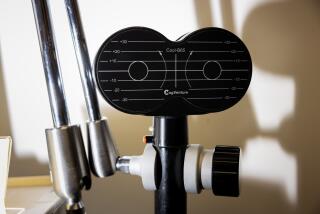Violent Autistics Spanked, Praised in Controversial School
- Share via
PROVIDENCE, R.I. — Michael Shields’ contorted face glows bright red through the white mask that prevents him from biting himself and others.
For the fourth time in 25 minutes, the autistic 21-year-old has thrown a tantrum, and he’s been placed flat on his back, his flailing arms and legs pinned with padded cuffs to a large plastic board.
Shields, a student at Behavior Research Institute Inc., is restrained by five staff members of the school for severely disturbed teen-agers and young adults.
Institute counselor Rob Duquette stoops just above Shields, waits for an opportunity to spank the squirming student, and strikes.
Shields then is quickly let loose and leaps back into the chair at his work station, quietly resuming his assigned task, folding washcloths. He is showered with rewards and praise from the people he just tried to attack. If he would let them get close enough, there would be hugs and kisses too.
Gets Congratulated
“Super job, Michael,” says teacher Peter Smith, constantly emphasizing the positive. “Way to sit in that chair, buddy. Take a penny, please. Cookie on the way.”
The institute’s methods of treatment are the subject of a court hearing. The Massachusetts Office for Children, which licenses Behavior Research’s seven group homes in that state, is asking Bristol County Probate Judge Ernest Rothenberg to lift his June order allowing the institute’s continued use of discipline to control violent behavior.
The parents of several autistic children at the institute want Rothenberg’s order made permanent and are seeking $15 million in damages from the state.
But Michael Shields’ mother supports the school’s handling of her son.
“It used to be he was assaulting people every five minutes. Now we’re starting to enjoy Michael,” Phyllis Shields said in an interview. “This is the only program where he’s really made any progress.”
Shields, whose hands are badly scarred from biting them, is assigned to Classroom D, where Behavior Research puts many of the toughest cases among its 45 primarily autistic, often violent and self-abusive students. They range in age from 13 to 29 and come from Massachusetts, New York, New Jersey, Delaware, Maryland and Wyoming. States pay $87,000 per student yearly.
Almost all have been barred from several other schools before coming to Behavior Research, where treatment includes “aversives” like the restraint and spanking Shields received, as well as pinches, unpleasant tastes, cold showers and vapor sprays. The school does not use mind-altering drugs or electric shocks.
Not 15 feet from Shields, John Concheri is totally unaware of what is happening to his classmate.
Concheri is standing at the Restrained Time Out station, the most severe of Behavior Research’s aversive treatments.
The station is about the size of a telephone booth. Concheri faces inside, his arms shackled to a counter and his legs bound. His head is covered with a white aviator-type helmet, and thick foam covers his eyes.
From a hose connected to the helmet, a stream of water vapor repeatedly shoots into the 22-year-old’s face. Each time, he must press a button to stop the spray. After 15 minutes, he is met with a towel and warm words of praise from institute staffers.
“I’d rather have my son get punished and get aversives than act like an animal the rest of his life,” Concheri’s mother, Mary Concheri, said later. “I tried 13 schools before BRI. He used to have 70 to 80 tantrums a day. It’s the only way to go with John. He’s excellent now.”
While Concheri and Shields are being tended, Wayne Mosely sits happily in a cordoned-off section of the room. It has been a fairly good day for Mosely, a strapping, amiable man-child who had a habit of escaping at night from his last treatment center and breaking into convenience stores to gorge himself.
Food is Mosely’s passion and his rewards for nonviolent behavior are frequently structured around it.
Like the other youths, he receives snacks throughout the day for acceptable behavior and earns nickels that can be applied toward food and other treats in the institute’s “Reward Store,” a multicolored hall filled with video games, stuffed animals, a popcorn machine, a tiny merry-go-round, a makeup table and other pleasures.
More to Read
Sign up for Essential California
The most important California stories and recommendations in your inbox every morning.
You may occasionally receive promotional content from the Los Angeles Times.













